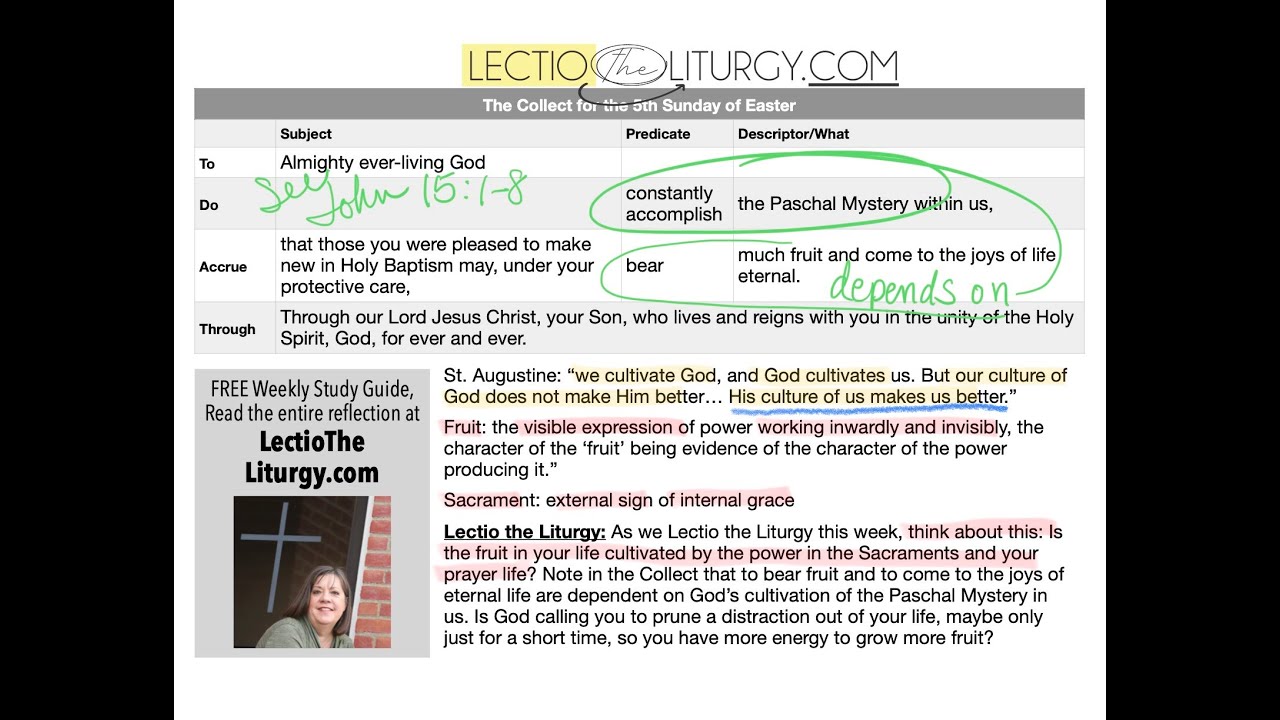Collect for the 5th Sunday of Easter
Thank you for praying with me as we Lectio the Liturgy with the Collect for the 5th Sunday of Easter. We are still reveling in the Easter Mystery in this week’s Collect, asking God to, at all times, perfect his saving work in us.
Almighty ever-living God, constantly accomplish the Paschal Mystery within us, that those you were pleased to make new in Holy Baptism may, under your protective care, bear much fruit and come to the joys of life eternal. Through our Lord Jesus Christ, your Son, who lives and reigns with you in the unity of the Holy Spirit, God, for ever and ever.
I’ve mentioned before how it seems that in celebrating year’s Holy Week celebrations, the relationship between Jesus’ Passion and Resurrection and our baptism is so much clearer to me. The pouring, or the submersion, at our baptism is to bring to mind Jesus’ death; our coming up from the water celebrates the resurrection, our new life, the same new life that Jesus experienced. Because of the Paschal Mystery, we are to live as redeemed children of God, living from the resurrection of Jesus and living in new life with the Trinity.
The Accure this week, let’s spend some time there, as we look at what it takes to bear more fruit. We learn more about God’s protective care in John 15, where the Father is the vinedresser. The branch that does not bear fruit is cut away, but the branch that does bear fruit is pruned so that it bears more fruit. St. Augustine said that “we cultivate God, and God cultivates us. But our culture of God does not make Him better: our culture is that of adoration, not of plowing: His culture of us makes us better.”
The Saint continues and says that God’s culture removes the seeds of wickedness from our hearts, opens us to the plow of his Word. He then sows the seeds of his commandments and waits for the fruits of piety.
Fruit is defined (Vine’s Dictionary) as, yes, of the fruit of trees, fields, the earth, that which is produced by the inherent energy of a living organism. Fruit is also defined as “of works or deeds, ‘fruit’ being the visible expression of power working inwardly and invisibly, the character of the ‘fruit’ being evidence of the character of the power producing it.” With that definition still fresh in your mind, fruit being the evidence of the character of the power producing it, think about the fruit of the mass.
The fruit of the mass is grace, forgiveness, peace, the Body and Blood of Christ, being together as the Body of Christ, examples of holy power producing good fruit. An example of bad fruit could be the radical protestors who destroy and burn. The power behind their character is not from God.
As I was thinking about fruit and wondered what fruit was evident in various parts of my day, I found an interesting connection between Sacrament and fruit. Sacrament is defined as an external sign of internal grace. Fruit is defined as the visible expression of power working invisibly.
As we Lectio the Liturgy this week, think about this: Is the fruit in your life cultivated by the power in the Sacraments and your prayer life?
Note in the Collect that to bear fruit and to come to the joys of eternal life are dependent on God’s cultivation of the Paschal Mystery in us. Is God calling you to prune a distraction out of your life, maybe only just for a short time, so you have more energy to grow more fruit?
Thank you for praying with me,
Julie
